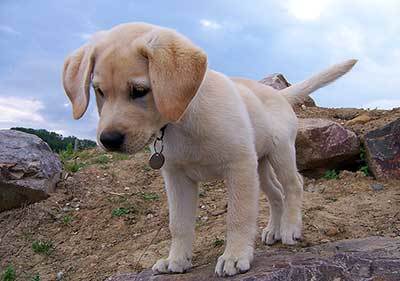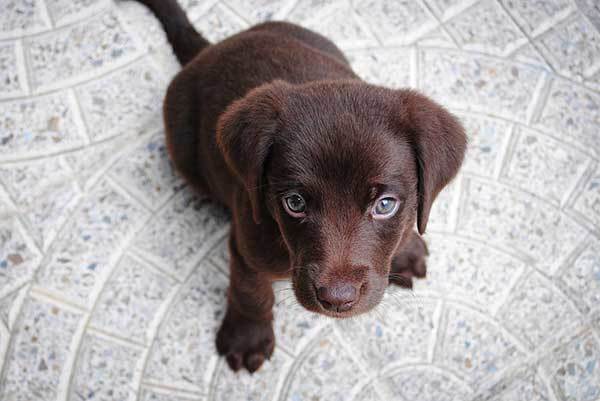As you probably already know, many people love mini dogs. The Miniature Labrador is one example that has generated excitement and controversy in equal measure.
But do Mini Labs really exist? Here’s everything you need to know about these little dogs.
Among pet lovers, Labrador Retrievers are one of the most reliable, adorable dog breeds you’ll ever come across. They are both intelligent dogs and dependable pets.
It’s not surprising that there has been an increase in the popularity of mixed breeds over the last few years. From Goldadors to Mastadors, it seems everyone craves a share of the lovable Labrador temperament.
That’s why there is an increasing demand for smaller versions of the amazing Labrador breed. Many pet lovers want a mini dog, one that can serve as a small-sized house pet without compromising on the personality of the original breed.
However, there’s a lot of confusion about what a Miniature Labrador means. Are they really Labrador Retrievers, dwarf Labradors or a totally new breed?
Does mini Labradors for sale really exist? And if so, are they good family pets? Let’s wrap our heads around the Mini Lab dog.
Table of Contents
What is a Miniature Labrador?
These small Labradors have several names, including Mini Labrador, Toy Lab, Teacup Labrador, Dwarf Labrador and Mini Labrador Retriever, to mention but a few.
Generally speaking, full grown Miniature Labradors stand two to six inches shorter than an original Lab and weigh about 10 to 20 pounds less.
They are available in the same original Lab colors and you can find both Mini Chocolate Labs and Miniature Black Labs.
Mini Labrador History
Designer dogs have grown in popularity over the last 30 years or so and the Mini Labrador meets the need for a smaller version of the Labrador Retriever that was originally bred in Newfoundland back in the 1500s.
To achieve the miniature status, dog breeders bred two purebred Lab parents to achieve highly sought-after Labrador personality in a smaller package.
Miniature Labrador Temperament
When it comes to temperament, Mini Labs are similar to the standard Labs. They are active, loving and friendly dogs and they are great with kids. This makes them great family pets.
Mini Lab Exercise Needs
Although Miniature Labradors are not large dogs, they are still energetic and will require one walk every day to meet their individual exercise needs.
You should also provide your dog with both physical and mental stimulation to avoid destructive behaviors. However, do not overdo this as his joints and bones may cause issues later on.

Miniature Lab Training
Mini Labs are intelligent little guys who will need and master obedience training and socialization quite easily.
However, it is still important to start training early if you want to end up with a well-behaved dog.
Mini Labrador Breeders
While Mini Lab dogs actually do exist, it doesn’t mean that everyone who claims to be a Mini Labrador breeder is actually offering real Mini Labradors for sale.
In fact, many dog breeders that claim to offer true Miniature Lab dogs are out there to make a killing out of unsuspecting buyers.
So, how do you know whether or not you’re dealing with a reputable breeder? Unfortunately, you need to do a lot of research and ask the breeder a number of questions to ensure you’re getting a good deal.
Firstly, the breeder should be able to provide proof with supporting documents that the Mini Lab puppy they are offering was actually a result of two purebred Lab parents.
If the breeder is able to provide supporting documents, then that’s a major step in determining whether or not you’re getting a good deal.
If the breeder is unable to do that, then chances are you’re being scammed and that they are out there to cash in on the recent trends.

Dog breeders that are unable to provide proper documents may have simply crossbred one Lab parent with a parent from a different breed that is simply small in size with the aim of getting another small-sized dog and sell it off as a Mini Labrador Retriever.
If someone tells you that a Mini Labrador differs from the original Labrador Retriever dog in any other way apart from size (whether that’s temperament, personality or character), then you need to know that that’s actually incorrect.
The only difference between a Mini Labrador and a standard Labrador Retriever dog is their size (in addition to the fact that Mini Lab dogs are more susceptible to various health conditions than standard Labrador Retrievers).
Miniature Labrador Retrievers and Dwarfism
For starters, Labrador Retrievers can inherit the dwarfism gene from their parents. This inherited condition is quite common in Labrador Retrievers.
In some cases, the deformity is caused by a pituitary gland problem, which hinders the production of sufficient growth hormones to attain their normal size.
The most prevalent form of dwarfism is dysplasia, a gene that can be tested to ascertain whether or not it’s present. This genetic mutation issue affects a dog’s skeleton and results in shorter legs.
Other common characteristics are larger heads and bent feet. However, this form of dwarfism is almost unnoticeable and usually doesn’t have a negative impact on the pup. As such, a dwarf Lab can still lead a happy and healthy life.
Miniature Labrador Retrievers: Health Concerns
By choosing two tiny pups of any breed and developing a mini puppy, there is a high probability that the puppy will inherit a lot of health problems that may persist for the rest of their life.
This type of breeding usually has a huge impact on the life of the puppy and dog breeders who purposely breed two mini dogs could put more strain on the dogs.
The original Labrador Retrievers are more susceptible than any other dog breed to experience a host of conditions and such problems can be worsened if the puppy was developed purely for abnormally tiny size.
As you can see, there are many health problems that a dwarf Labrador can suffer from, and these include elbow and hip dysplasia, eye issues, hypothyroidism, fragile bones and weak muscles that prevent them from performing various physical activities.
Pedigree
Mini Lab dogs are usually bred from two smaller-than-usual lab parents to increase the chances of getting tiny puppies.
Since the Mini Lab is a cross breed, he cannot join the AKC’s list of officially recognized dog breeds. However, he does belong to a good lineage that is widely considered to be among the best. This includes the Labrador Retriever who was officially recognized by the AKC way back in 1917.
Even if the parent dogs do not carry the gene responsible for dwarfism, such puppies could still suffer from various health problems.
So Mini Labrador Retrievers actually do exist, and you can find Mini Labradors for sale, but they are not a unique breed.
Labs are available in various sizes, but intentionally breeding them with the aim of reducing their sizes further is not the best thing for both the dog and his owner. However, you can still find small Labradors and take good care of them, especially if you know your stuff.
Where to Find Mini Labrador Puppies for Sale?
Obviously, mini labs need a loving home, so rescue centers might be a good place to start your search for these little guys.
Since it’s not easy to choose a good Mini Lab breeder, it’s strongly recommended to find puppies that already need an owner and a home rather than getting one from a puppy farm that breeds mini dogs only.
Feeding Information & Lifespan
Don’t let their miniature status fool you; the small Labrador will need about 1.5 cups of high-quality dry dog food every day.
Make sure his diet is specifically provided based on his age and activity level. Also, divide his daily food into two to three meals and make sure to avoid common preservatives and fillers to avoid digestive issues.
Life Expectancy
The average life span of a Miniature Labrador is 10 to 14 years, but some sadly do not make it to that age, depending on the conditions he has inherited from his parents and the events that occur during his life.
Conclusion
As with any other dog or pet, you’ll sometimes come across very small Labradors.
If this pup is healthy and happy, that’s great. He will not win any dog shows, but he can still be a loving pet and offer all the benefits that come with owning a dog.
The good news is that there is a loving pup out there for you, but it is important to know as much as you can before bringing him home.
There are a lot of uncertainties concerning Mini Labrador Retrievers, but you can still find one that will bring smiles to your face for many years to come.
As always, find out the potential health problems, history and temperament before you add it to your family. Learn more about the puppy you’re considering and make sure you’re dealing with a reputable breeder that will provide proof that the Mini Lab puppy is actually a result of two purebred Lab Retriever parents.


